May 22, 2025 | 14:11 GMT +7
May 22, 2025 | 14:11 GMT +7
Hotline: 0913.378.918
May 22, 2025 | 14:11 GMT +7
Hotline: 0913.378.918
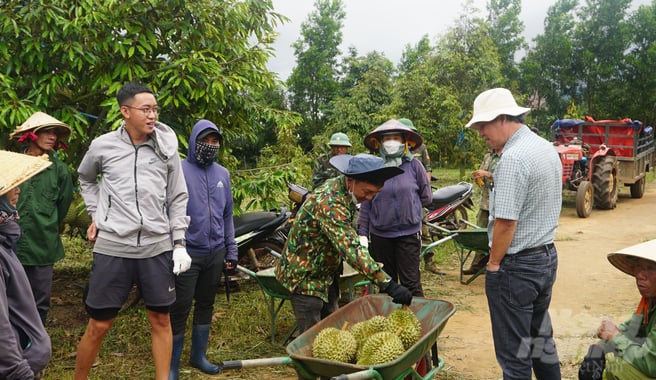
Bau Duc discussed with traders harvesting durian. Photo: Nguyen Thuy.
During my business trip to Gia Lai, I had the opportunity to visit the circular agriculture model of Hoang Anh Gia Lai Joint Stock Company, located about 50km from the center of Pleiku City.
He drove us through the forests to his farms, said Mr. Doan Nguyen Duc (Bau Duc), Chairman of the Board of Directors of Hoang Anh Gia Lai Joint Stock Company, experiencing many ups and downs, changing the situation. Evolving business model when he was at the peak of real estate, he was attached to and loved agriculture.
After more than 15 years of investing in the agricultural sector from rubber, oil palm, passion fruit, vegetables, cows, and chickens, Bau Duc said, Hoang Anh Gia Lai decided to stop converting the model of doing business and sticking to "two trees - one animal", including bananas, durians, and pigs.
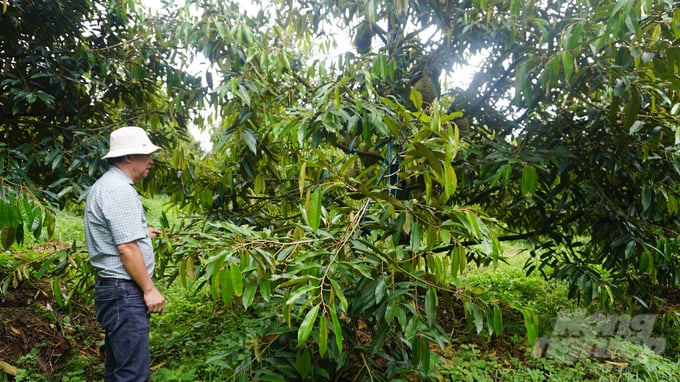
Bau Duc took us to see the durian garden being harvested. Photo: Nguyen Thuy.
Thanks to the systematic care process, the first durian garden harvested 500 tons at a bucket price of VND 77,000/kg to the trader, bringing Hoang Anh Gia Lai a revenue of VND 18 billion, while the cost was about VND 3.6 billion.
Hoang Anh Gia Lai has a total area of 7,000 hectares of bananas planted annually in Gia Lai, Laos, and Cambodia. With an export banana output of over 82,000 tons (the first 6 months of 2023), mainly to China, Japan, Korea, and distribution to the domestic market, Hoang Anh Gia Lai is expected to expand its banana area to 10,000 ha.
Bananas are full of good nutrients such as starch, potassium, and microelements, so Bau Duc is always looking for ways to take advantage of this product with high nutritional value. In early 2021, after researching and researching, Bau Duc started raising pigs to eat bananas. He quietly built a barn, a food processing plant, imported sows, and started selling Bapi HAGL pork to the market.
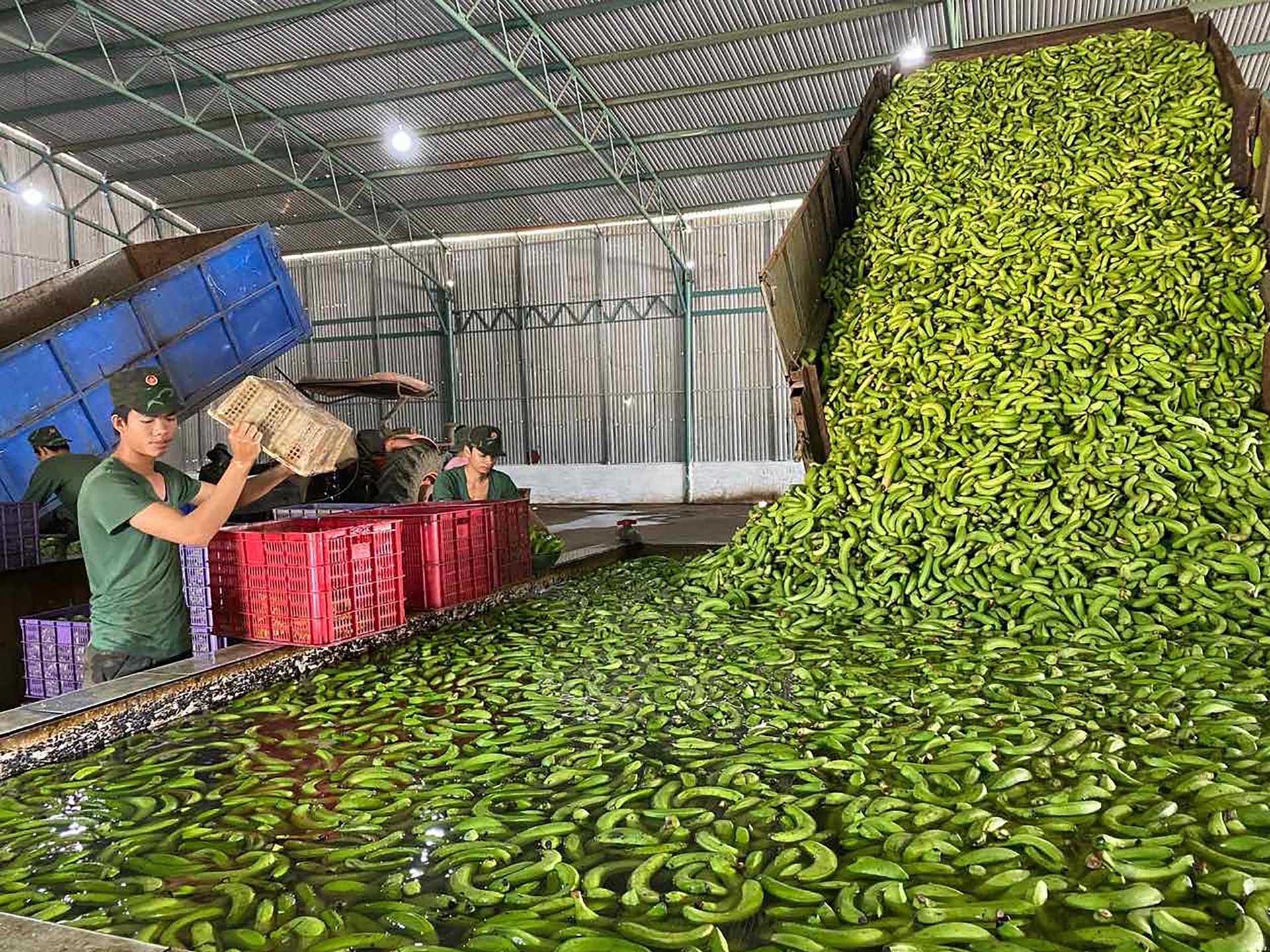
Bananas are not qualified for export to be treated as a feed source for pigs. Photo: Nguyen Thuy.
Previously, each year, Hoang Anh Gia Lai had to dispose of hundreds of thousands of tons of bananas during the harvesting process, failing to meet the standards for export to Japan, Korea, and China, which must be discarded or found to be disposed of, costly and labor intensive. According to preliminary calculations of Hoang Anh Gia Lai, 6,000ha of bananas will produce 90,000 tons of waste bananas. Hoang Anh Gia Lai's livestock company will buy back these bananas as animal feed for VND 3,000/kg.
The rejected bananas are now brought to the processing plant, ground into powder, and mixed with soybeans, corn, vitamins, and herbs for pigs to eat. "The use of herbs to replace antibiotics, pigs eat bananas, make the quality of Hoang Anh Gia Lai's pork different and better," Bau Duc confidently affirmed.
To ensure a closed circular agricultural process, increase economic profits, and leave nothing behind, HAGL also invests in a modern and automated system at the food processing plant to mix ingredients, with 600 tons/day capacity.
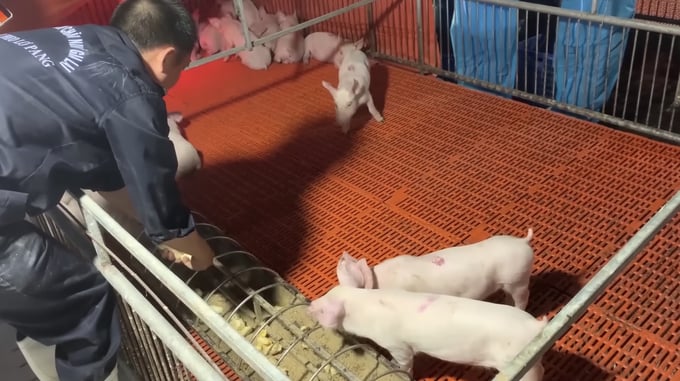
Feed the piglets with ripe bananas to supplement nutrition.
9 pig farming clusters, well-built and clean, are located in the "core zone" of banana farms. Coming here, we were not "shocked" by the foul smell of the pigsty like other farms. Although each cluster of cages has up to thousands of pigs, it is always clean. All manure is carried out according to a closed process, so the barn is always cool and has no bad smell.
Staff on duty at the barn area carefully record each herd, meal time, quantity of food, monitor the health of pigs... Not only that, but Hoang Anh Gia Lai also invested in more laboratories to handle diseases in pigs actively so that Hoang Anh Gia Lai pigs develop well.
Mr. Tran Van Dai, Director of Livestock Production of Hoang Anh Gia Lai, said that thanks to waste bananas, the company is confident that it can compete on price compared to the market with high-quality pork.
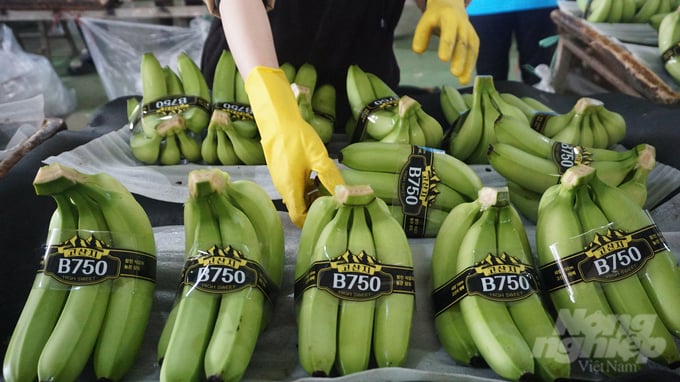
Currently, bananas are Hoang Anh Gia Lai's primary source of income. Photo: Nguyen Thuy.
According to Mr. Dai, from July 1, 2023, Circular 28 of the Ministry of Agriculture and Rural Development took effect, allowing livestock wastewater (conformity) to irrigate crops. All waste from the pigsty is collected into a biogas cellar, led through a microbiological treatment cellar, and then washed with bananas and durians.
In addition, Mr. Dai and experts from the University of Agriculture and Forestry in Ho Chi Minh City have researched hydrolysis and biological technologies and applied them at Hoang Anh Gia Lai to process livestock by-products into foliar fertilizers for banana and durian trees, solving the problem of waste treatment costs, and creating an environmentally friendly environment.
Bau Duc says raising pigs is not tricky, but they must eat the right amount and quality. With available bananas, Hoang Anh Gia Lai's piglets have a low cost because animal feed accounts for 80% of the cost. On the other hand, the price of bananas is currently at US$ 10.5/barrel and has a stable market in China, Korea, and Japan. As for durian, a fruit with high economic value that not all fruits have, with 1,200 hectares of durian, will be a "gold mine" when the market demand is too great.
Translated by Tu Quyen
![Reducing emissions from rice fields: [3] New values generated from carbon credit](https://t.ex-cdn.com/nongnghiepmoitruong.vn/608w/files/content/2025/05/19/dsc09613-144700_71-150957.jpg)
(VAN) In addition to helping safeguard the environment, the low-emission rice cultivation model also generates new opportunities for farmers by leveraging the carbon credit market.
![Ho Chi Minh city adapts to climate change: [1] Vulnerable in the whirlwind of development](https://t.ex-cdn.com/nongnghiepmoitruong.vn/608w/files/duyenht92/2025/05/19/3131-ngap-nongnghiep-163121.jpg)
(VAN) As the country's economic engine with a rapid urbanization rate, Ho Chi Minh city is facing increasingly serious consequences of climate change.
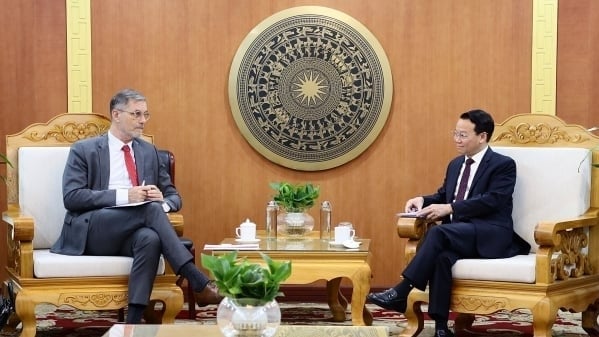
(VAN) On May 21, Minister of Agriculture and Environment Do Duc Duy worked with Mr. Olivier Brochet, Ambassador Extraordinary and Plenipotentiary of the French Republic to Vietnam.
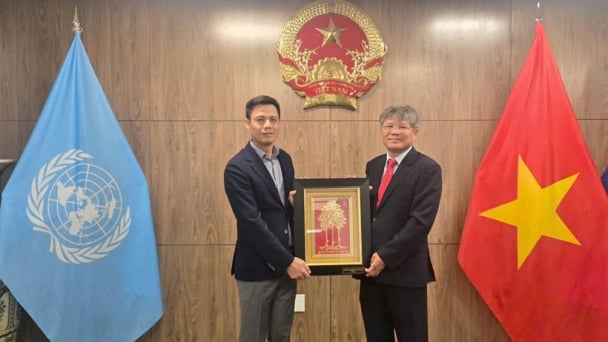
(VAN) VRG recently conducted a visit and working trip to the United States to demonstrate its efforts in redefining the role of rubber enterprises in the global value chain.

(VAN) In 2024, over 295 million people across 53 countries and territories faced acute hunger—an increase of almost 14 million people compared to 2023, while the number of people facing catastrophic levels of hunger reached a record high.

(VAN) World Environment Day 2025 (June 5) carries the theme 'Beat Plastic Pollution' continuing to emphasize the global urgency of addressing the plastic waste crisis.

(VAN) This was the assessment shared by experts at the workshop titled 'Assessing the Role and Potential of Low-Emission Rice Production Systems in Vietnam,' held on the morning of May 19.